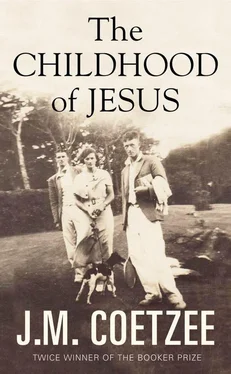‘In a manner of speaking. She saw him in her dreams. She knew he was coming. She was waiting for him. Now he has come, and she is overjoyed. Her heart is full.’
The boy is silent.
‘Fidel, I have to get back to work now. I’ll see you and your mother this evening.’
‘Is her name Inés?’
‘David’s mother? Yes, her name is Inés.’
‘I don’t like her. She’s got a dog.’
‘You don’t know her. Once you get to know her you will like her.’
‘I won’t. It’s a fierce dog. I’m scared of it.’
‘I have seen the dog. Its name is Bolívar, and I agree, you should steer clear of it. It is an Alsatian. Alsatians tend to be unpredictable. I’m surprised she has brought it to the Blocks.’
‘Does it bite?’
‘It can.’
‘And where exactly are you living,’ asks Elena, ‘now that you have given up your nice apartment?’
‘I told you: I have taken a room near the docks.’
‘Yes, but where exactly? In a boarding house?’
‘No. It doesn’t matter where it is or what kind of room. It is good enough for my purposes.’
‘Does it have cooking facilities?’
‘I don’t need cooking facilities. I wouldn’t use them if I had them.’
‘So you are living on bread and water. I thought you were sick of bread and water.’
‘Bread is the staff of life. He who has bread shall not want. Elena, please stop this interrogation. I am perfectly capable of caring for myself.’
‘I doubt that. I doubt it very much. Can the people at the arrivals centre not find you a new apartment?’
‘As far as the Centre is aware, I am still happily situated in my old apartment. They are not about to award me a secondary residence.’
‘And Inés — did you not say that Inés has rooms at La Residencia? Why can’t she and the child stay there?’
‘Because children aren’t allowed at La Residencia. La Residencia is a kind of resort, as far as I can work out.’
‘I know La Residencia. I have visited there. Do you know she has brought a dog with her? It’s one thing keeping a small dog in an apartment, but this is a great big wolfhound. It’s not hygienic.’
‘It’s not a wolfhound, it’s an Alsatian. I admit, it makes me nervous. I’ve warned David to be careful. I’ve warned Fidel too.’
‘I will certainly not allow Fidel anywhere near it. Are you sure you have done the right thing, giving your child away to a woman like that?’
‘To a woman with a dog?’
‘To a childless woman in her thirties. A woman who spends her time playing sports with men. A woman who keeps dogs.’
‘Inés plays tennis. Lots of women play tennis. It’s enjoyable. It keeps you fit. And she has only one dog.’
‘Has she told you anything about her background, her past?’
‘No. I didn’t ask her.’
‘Well, in my opinion you are out of your mind, handing over your child to a stranger who for all you know has a dubious past.’
‘That’s nonsense, Elena. Inés has no past, none that counts. None of us has a past. We start anew here. We start with a blank slate, a virgin slate. And Inés is not a stranger. I recognized her as soon as I set eyes on her, which means I must have some kind of prior knowledge.’
‘You arrive here with no memories, with a blank slate, yet you claim to recognize faces from the past. It makes no sense.’
‘It is true: I have no memories. But images still persist, shades of images. How that is I can’t explain. Something deeper persists too, which I call the memory of having a memory. It is not from the past that I recognize Inés but from elsewhere. It is as if the image of her were embedded in me. I have no doubts about her, no second thoughts. At least, I have no doubt that she is the boy’s true mother.’
‘Then what doubts do you have?’
‘I only hope she will be good for him.’
In retrospect that day, the day when Elena sent her son to the docks to call him, marks the moment when he and she, whom he had thought of as two ships on a near-windless ocean, adrift perhaps, but drifting on the whole towards each other, began to drift apart. There is much that he still likes about Elena, not least her readiness to give ear to his complaints. But the feeling hardens that something that ought to be between them is missing; and if Elena does not share that feeling, if she believes that nothing is missing, then she cannot be what is missing from his life.
Sitting on a bench outside the East Blocks, he writes a note to Inés.
I have grown friendly with a woman who lives across the courtyard, in Block C. Her name is Elena. She has a son named Fidel who has become David’s closest friend and a steadying influence on him. For a youngster Fidel has a good heart, you will find.
David has been taking music lessons with Elena. See if you can persuade him to sing for you. He sings beautifully. My feeling is that he should go on with his lessons, but of course the decision is yours.
David also gets on well with my foreman at work, Álvaro, another good friend. Having good friends encourages one to be good too, or so I find. To follow in the ways of goodness — isn’t that what we both desire for David?
If there is any way in which I can help [he concludes] you have only to raise a finger. I am at the docks most days, on Wharf Two. Fidel will take messages; David knows the way too.
He drops the note in Inés’s letter box. He expects no reply and indeed receives none. He has no clear sense of what kind of woman Inés is. Is she the kind of woman prepared to accept well-meant advice, for instance, or is she the kind that gets irritated when strangers tell her how to run her life, and tosses their communications in the trash? Does she even check her letter box?
Located in the basement of Block F of East Village, the same block that houses the communal gymnasium, is a bakery outlet for which his private name is the Commissariat. Its doors are open on weekday mornings from nine until noon. Besides bread and other baked goods, it sells at laughably low prices such basic foodstuffs as sugar, salt, flour, and cooking oil.
From the Commissariat he buys a stock of canned soup, which he carries back to his hideout at the docks. His evening meal, when he is by himself, is bread and bean soup, cold. He grows used to its unvaryingness.
Since most tenants of the Blocks use the Commissariat, he guesses that Inés will use it too. He toys with the idea of hanging around there of a morning in the hope of seeing her and the boy, but then thinks better of it. It would be too humiliating if she stumbled on him lurking among the shelves, spying on her.
He does not want to turn into a ghost unable to quit its old haunts. He is ready to accept that the best way for Inés to build up trust with the child is to have him for a while all to herself. But there is a nagging fear he cannot dismiss: that the child may be lonely and unhappy, pining for him. He cannot forget the look in the child’s eyes when he visited, full of mute doubt. He longs to see him again as he used to be, wearing his little peaked cap and black boots.
Now and again he gives in to temptation and dawdles around the outskirts of the Blocks. On one such visitation he glimpses Inés gathering up the washing from the line. Though he cannot be sure, she seems tired, tired and perhaps sad. Can it be that things are going badly with her?
He recognizes the boy’s clothing on the line, including the blouse with the frilly front.
On another — and, as it turns out, the last — of these surreptitious visits he observes the family trio — Inés, the child, the dog — emerge from the Blocks and set off across the lawns in the direction of the parklands. What surprises him is that the boy, clad in his grey coat, is not walking but being pushed in a stroller. Why does a five-year-old need to be wheeled? Why indeed does he permit it?
Читать дальше












